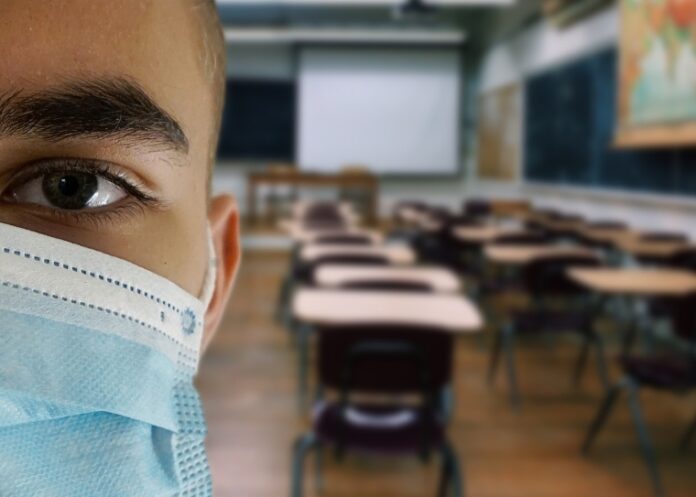By Glenn Ellis
(TriceEdneyWire.com) – Will the vaccine slow down the rate of transmission of Covid-19?
This is one of the key questions that scientists will be seeking to answer over coming weeks. The vaccines now being administered are designed to protect people from severe side-effects of the disease. They were not developed to block transmission of the virus. They are meant for you to be protected against serious illness but still carry the virus and spread it to others. However, scientists believe (and are hoping) that the vaccines should reduce viral load in those inoculated and there should then be a reduction in transmission. In the meantime, face masks will continue to be the order of the day.
Getting use to everybody wearing masks is certainly a new experience for us grownups, and one that we probably never imagined. It looks like wearing face masks will be a way of life for us for the near future. But can you imagine how confusing, scary, and even traumatizing face mask wearing is for kids and young people? I honestly don’t know how I would have handled it when I was a kid. Adults and parents in the lives of our young people must be vigilant about providing the information and support they will need.
For starters, what kind of masks are best for protection? Sure, any mask will have some effect, but cloth masks are less than half as effective as surgical masks at protecting the person wearing the mask. Surgical masks are two to three times as effective as cloth masks. Remind young people that it is important that teachers, postal workers, delivery people, cashiers, restaurant workers, and anyone they come in contact with whose work involves regular contact with other people should be wearing a mask.
I know we’ve heard all about N95 face masks. They are tested to show they are 95 percent effective. However, not only are they more expensive, but the research has also found that there is no evidence that the N95 face masks are better at protection than the simple green or blue surgical masks. There is a reason it is standard, required gear in hospital operating rooms!
By the way, make sure we show young people know how to wear their face mask properly, a mask helps block large-particle droplets, splashes, sprays, or splatter that may contain germs, viruses, or bacteria), keeping it from reaching the mouth and nose and infecting you. The whole point of surgical masks is to help reduce exposure of your saliva and respiratory secretions to others. In medical history, the surgical mask was invented not to protect the surgeon, but to protect the patient from the surgeon; you know, coughing into the open surgical wounds and causing infection in the patient. So, it doesn’t protect the doctor from the patient. Keep that in mind when you need motivation to maintain social distancing.
So how good is a good cloth mask? Single- and double-layer cloth masks made from lightweight, low-thread cotton are the least effective. I know they have some very stylish, cute cloth ones out there, but the researchers also found that gaps at the edges of an ill-fitting, flimsy cloth mask can reduce filtration efficiency by 60 percent. If you walk around any city in the U.S., some people are wearing masks over their noses and other ones are wearing them hanging off one ear. But cloth masks are far from useless; they are the best alternative to the more expensive N95, and they offer almost the same protection. Even the CDC says that when surgical masks are unavailable, cloth masks are a more suitable option for use in the general public.
As parents, we have a lot of impact on the meaning that children attach to their experiences. From about the age of 8 months, children look at others’ reactions to see how they should respond. Psychologists call this “social referencing.” For example, when kids see a dog for the first time, they look at the dog, then look up at their grown-ups to see, “Should I be scared, here?” If the grown-ups are calm or positive, it makes it easier for the kid to be calm or positive.
The same thing applies to masks: If we are calm and positive about wearing masks, it will be easier for our kids to be calm and positive about them, too. On the other hand, if our words or reactions say, “This is terrible! This is unbearable! You can’t possibly tolerate this!” we put an extra burden on our children.
The most important tips to continuously share with children and young people about face masks is: Don’t leave your nose or mouth uncovered. Don’t remove the mask while around others in public. Don’t share your mask with family members or friends. And remember, a mask is not a substitute for social distancing. Let’s continue to take care of our young people!
Remember, I’m not a doctor. I just sound like one! Take good care of yourself and live the best life possible!
The information included in this column is for educational purposes only. I do not dispense medical advice or prescribe the use of any technique as a replacement form of treatment for physical, mental or medical problems by your doctor either directly or indirectly.
Glenn Ellis, MPH is a Visiting Scholar at The National Bioethics Center at Tuskegee University and a Harvard Medical School Bioethics Fellow. He is author of Which Doctor? and Information is the Best Medicine. Ellis is an active media contributor on Health Equity and Medical Ethics.
For more good health information visit: www.glennellis.com.






